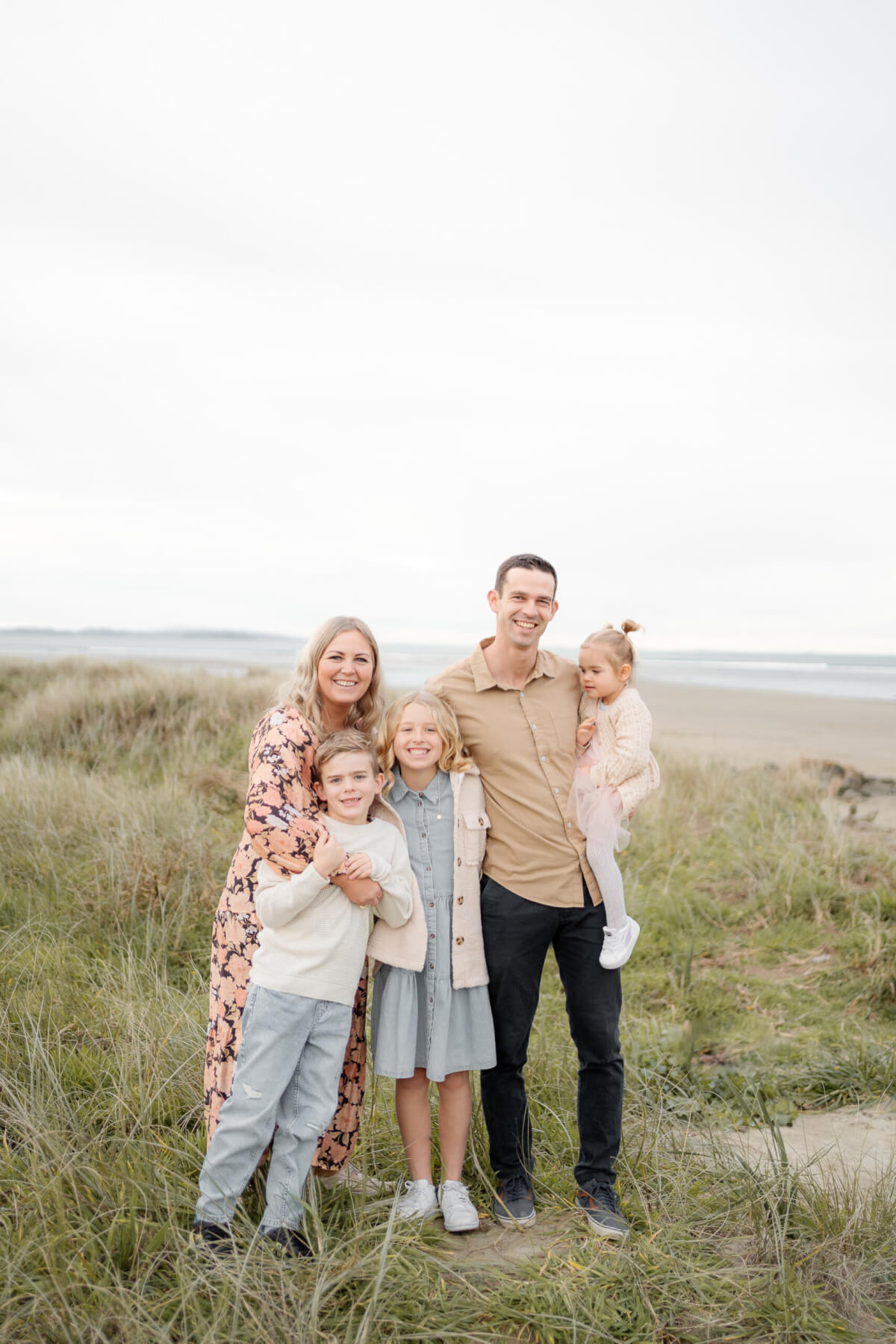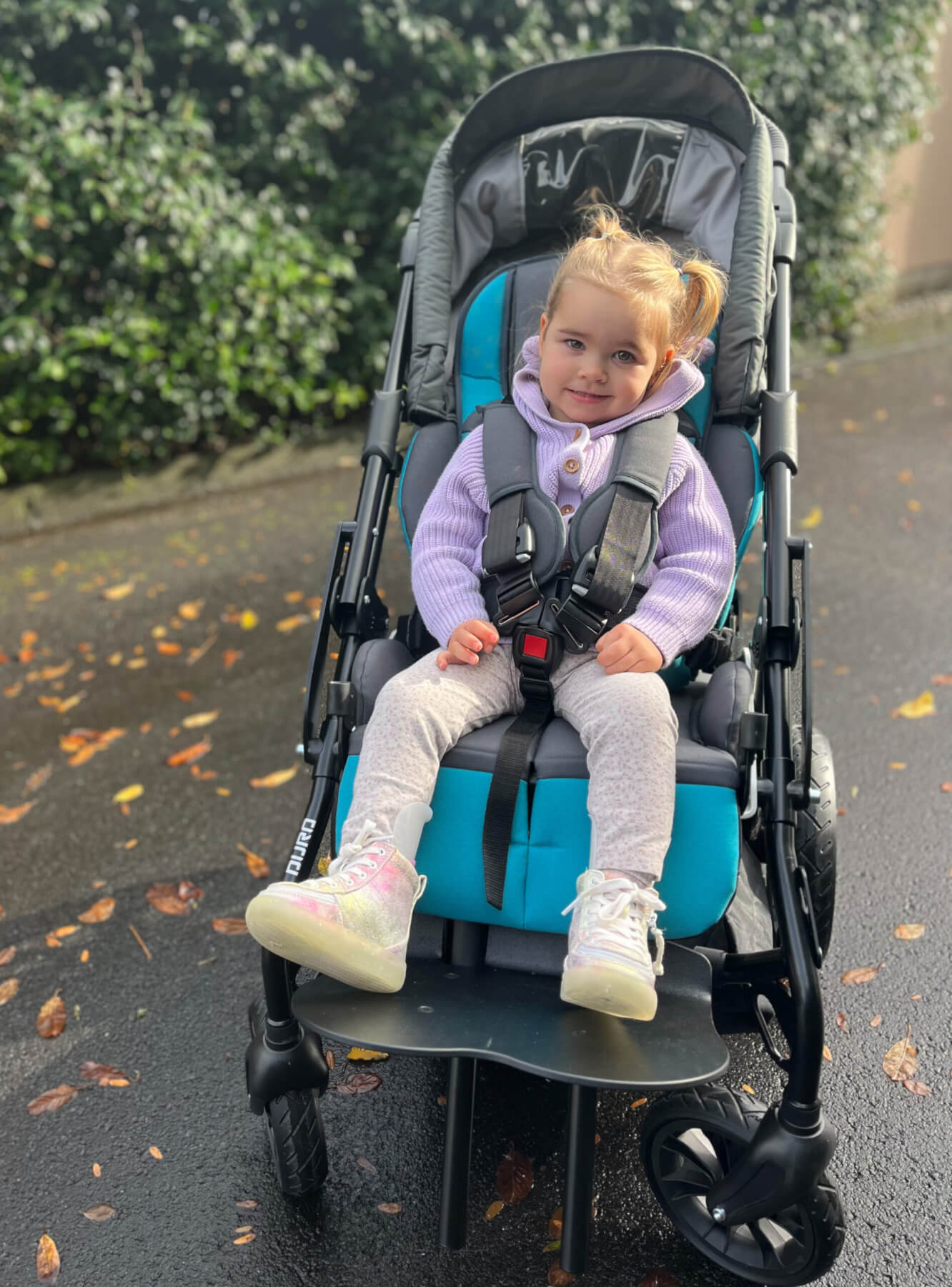
Emery Cooper at McKenzie Centre in Hamilton. Photo: Susie Nyika.
Emery Cooper has been a regular at McKenzie Centre in Hamilton for nearly a year and her progress has given parents Kathleen and Stefan hope for their daughter’s future.
Born in October 2020, Emery is the Waipā couple’s third child after Myla, 10, and Arlo, 7. They live in Te Awamutu.
When she was about a year old, she was still not crawling or rolling so Kathleen took her to a physiotherapist.
“Around 14 months old she regressed in her speech and social skills. She stopped babbling, she no longer looked anyone in the eye, and she wouldn’t respond to her name.
“She also lost weight and her head had stopped growing. We were incredibly worried and went desperately searching for answers, and as she lost the use of her hands, we were led to the devastating diagnosis of Rett Syndrome,” says Kathleen.

The Cooper family of Te Awamutu: Kathleen, Arlo, Myla, Stefan and Emery. Photo: Jemma Chan Photography.
Rett syndrome is a rare genetic neurological disorder that occurs almost exclusively in girls and leads to severe impairments, affecting nearly every aspect of the child’s life: their ability to speak, walk, eat, and even breathe easily.
First identified by Austrian paediatrician Andreas Rett in 1966, it is usually recognised in children between six to 18 months as they begin to miss developmental milestones or lose abilities they had gained.
Recent research has shown that gene therapy has the potential to treat or even reverse several aspects of Rett Syndrome by restoring the body’s production of methyl cytosine-binding protein 2.
Kathleen says they hope Emery will have gene therapy in her childhood.
“Although we love her just the way she is, we hold on to the hope that she will be able to access gene therapy in her childhood. We think this will give her a chance to gain back the skills Rett Syndrome has stolen from her.”
In the meanwhile, the team at McKenzie Centre provides the expertise Emery needs.

McKenzie Centre helped Kathleen and Stefan get this adaptive push chair for Emery. Photo: Supplied.
“They’re like a family to us, we go there and feel like the team of therapists and other parents wrap us in their support, care and knowledge,” says Kathleen.
Being with other whānau is another big plus. “I have learned so much from other families who give us ideas.”
The centre was established in 1984 and provides early childhood intervention and support for children/tamariki from birth to school age with a developmental delay or disability.
“Our concerns are always listened to, and they are great at brainstorming new ideas to help Emery and put into place in her life.
“She’s definitely communicating better with her eyes and she’s getting stronger physically since starting at McKenzie Centre.”
Rett Syndrome is so rare there are fewer than 100 children in New Zealand with the condition.
Emery attends McKenzie Centre every Wednesday morning during term time.
“That’s when we can really talk about Emery and what she needs. If there is equipment, we feel she needs, McKenzie Centre do what they can. We bring it up with the occupational therapist or the physio and they make it happen.”
Like Emery’s adaptive push chair.
“That’s something McKenzie Centre hooked up for us,” says Kathleen who found the previous chair was not good for Emery as she was always slumping to one side.
Having the right support is critical as those with Rett Syndrome are susceptible to scoliosis.
Emery also sees a McKenzie Centre speech therapist who uses a low tech eye gaze Augmentive and Alternative Communication system to help learn how much she really understands.
“She is smart, she very clearly communicates what she wants by looking at the correct symbols.
“We are so excited for when she has access to an eye gaze device as she will be able to tell us so much more.”
In three years, Kathleen hopes Emery can mainstream into Te Awamutu Primary School, where her older children go.
“We do think she can keep up intellectually wise. With the right adaption, she should be able to learn with everyone her own age.”
McKenzie Centre offers a variety of programmes for children, delivered in partnership with families/ whānau. A team of passionate and skilled therapists, teachers, education support workers and tuakana (peer workers) deliver multiple services while specialists provide information and skills relating to their professional background.
Practical services and support help children/tamariki and families/whānau enjoy and use the time they spend together, every day, as valuable learning opportunities.

Emery Cooper at McKenzie Centre in Hamilton. Photo: Susie Nyika.








